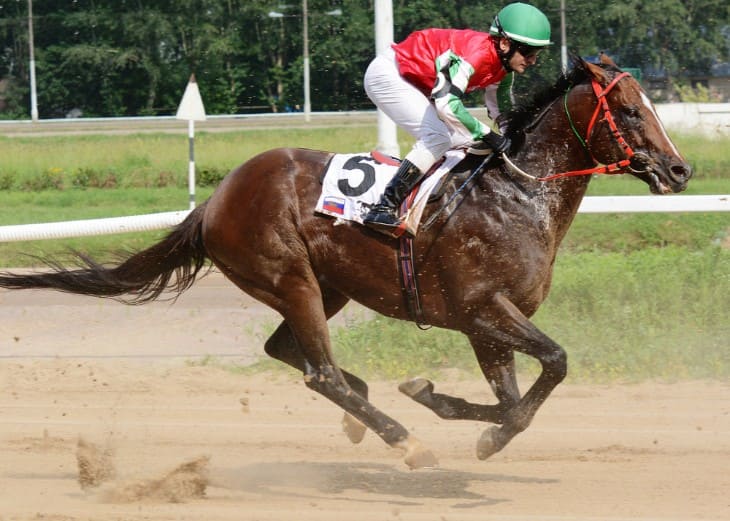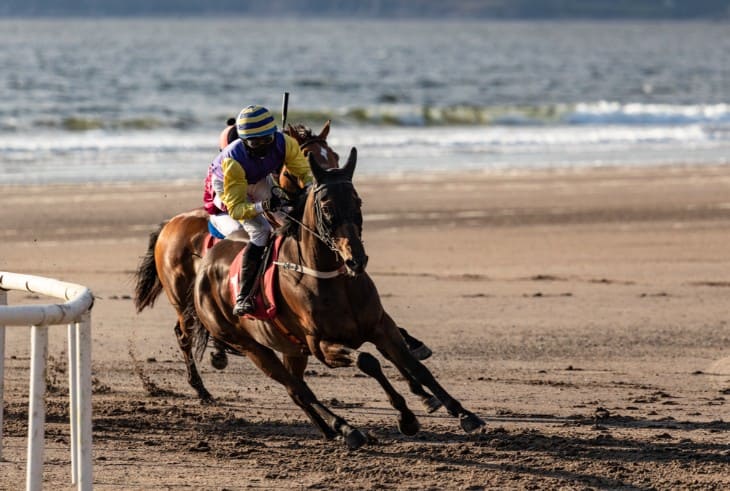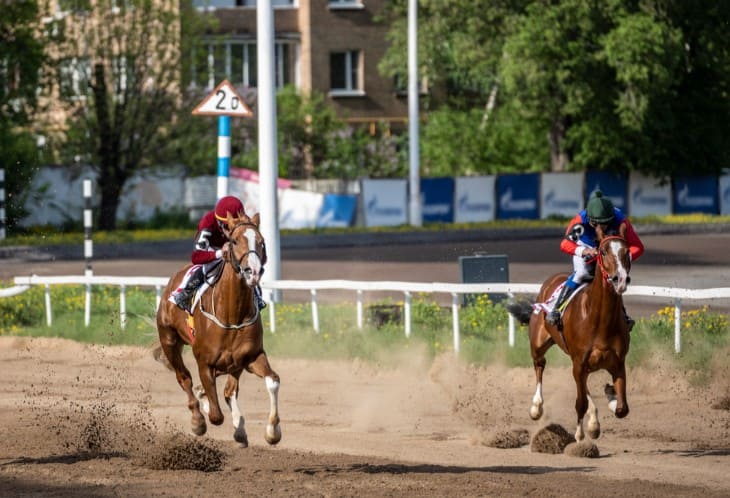The Grand National is an interesting horse race which takes place in England, United Kingdom yearly at Aintree Racecourse in Liverpool. This race is steeplechase and covers a distance of about four and a quarter miles. It is known for being famous and exciting.
In the Grand National horses are given different weights based on their performance in prior races so as to create a level playing field. This makes it fair for every horse. The aim is to make all horses have equal chances of winning notwithstanding their previous performances.
Safety precautions for the horses are very important in the Grand National. There are regulations that look out for the welfare of these animals. They have veterinary officers who examine them and they cannot use any drugs that would improve their running abilities because this might endanger them.
In the Grand National, everyone must follow rules as they pertain to jockeys who must ensure nothing dangerous happens during the race; if regulations are flouted there will be penalties.
Hence, the Grand National is one distinctive event in horse racing, well-known and thrilling too. Rules guarantee that it remains fun, safe, and equitable for each participant.
The Importance of Racing Regulations and Rules
To layman's understanding, horse racing may appear as a simple sport between horses ridden by jockeys' but beneath lies a complex web of regulations crafted with care to ensure integrity, safety fairness within this game.
Ensuring Fair Competition
In fact fairness is crucial when it comes to grand national. Each horse has rules set up to make sure that every single one has an equal chance with others of winning it all; this article explains how:
- Weight Allocation: Weight allocation means giving everyone an equal chance. Horses have different loads according to what they did before now Better-performing horses carry more weight making competition even.
- Handicapping: Handicapping levels the ground similarly so that strong horses can meet some challenge through assigned weight by the official handicapper.
- The Starting Line: How horses start is also important. They have to line up correctly, so it's fair. If a horse begins too early or too late, they will be disqualified.
- Fair Conduct: Jockeys must ride fairly. They can't block other horses or do anything that's not right. Fair play is crucial in horse racing.
- Penalty for Breaking Rules: Horses and riders who dishonour the rules are penalised. These penalties may involve disqualification of the rider's or the owner's mount from competing in any more races.
The excitement of Grand National comes from fair competition; such fairness ensures that every horse has an equal chance regardless of its previous performance regulations making sure that all horses stand on a level ground thereby making racing both balanced and enjoyable.

Safety Measures for Horses
Taking care of horses is very important in horse racing, for example, Grand National. We have rules to ensure that the horses are safe and well.
Firstly, prior to the race, each horse undergoes a vet check to ascertain if it is healthy. When a horse is unwell it cannot race. This is aimed at protecting them from injury.
Horses are not permitted to use drugs which might enhance their speed. That’s why this rule exists: to avoid any harm or over-exertion. It’s all about their safety.
When during competition an injury occurs on a horse, he must stop and receive assistance. This is done with the aim of providing immediate care.
The jockeys who ride these horses need also to be careful; they should not be rough or perform acts that could hurt the animal. If they do there are consequences.
All these rules exist so as to guarantee that the horses involved in Grand National are safe and sound. Taking into account that they are being looked after and shielded forms part of what makes this event great.
Upholding Integrity
Like every other sport, integrity plays a critical role in the Grand National. It means being honest and playing by the rules . Here’s how it can be maintained:
- Strict Codes of Conduct: All people participating in racing including jockeys, trainers and owners have strict codes of conduct to follow during these events to ensure everyone behaves fairly towards one another.
- Anti-Cheating Measures: Cheating has no place in racing! The anti-cheating measures aim at preventing cheating such as administering illegal substances on horses or tampering with race outcomes through malpractices. These regulations protect the integrity of the game.
- Transparency: The race is transparent where every bit of information needed for anyone willing to know more about it is provided openly hence the public knows about rules including weights given for specific races as well as key jockeys taking part in those races. This openness helps build trust within the industry.
- Punishments for Wrongdoing: There are penalties when someone breaks the rules or acts dishonestly. Such punishments may include fines, suspensions and even being banned from racing as a message that integrity is taken seriously.
- Independent Officials: The race is overseen by independent officials who have no connection with racers or gamblers. These people ensure fairness in the conduct of everything.
The Key Regulations in Grand National
Now that we understand why racing must have rules and regulations, let’s delve into some of the important regulations specific to Grand National.
Weight Allocation
Jumping is a big part of Grand National. The race involves difficult jumps such as Becher’s Brook and The Chair. Those jumps can be dangerous, so there are several rules to make sure they do them safely.
These obstacles are to be jumped over during the race by horses. It is not easy because some of these jumps are very big so they must be cleared without falling over.
One critical rule is that horses cannot jump just anyhow. They can’t jump at any angle on top of an obstacle but there should be a specific way to approach and clear such hurdles safely.
The jumps test both the skill and agility of the horse as well as its jockey behind all this excitement; however, it can also prove risky sometimes jumping regulations therefore become essential
If a horse and jockey break the rules, they will be disqualified from the race. This is ensured by the regulations that make sure that the race is both exciting and safe for all participants.
So, jumping regulations in the Grand National are important to horse’s safety as well as jockeys. They keep it a demanding spectacle which however has a low probability of accidents happening. For instance, these rules add excitement and drama to the Grand National making it different from other horse racing events.
Jumping Regulations
In the Grand National, jumping is an integral part of racing. To ensure everything goes off without incident or harm, there are very specific jumping regulations:
- Clearing the Obstacles: Horses in the Grand National must jump over obstacles like Becher's Brook and The Chair. These jumps are challenging and require skill and precision. Jumping safely is essential. Horses need to approach the jumps correctly, at the right speed, and take off from the right spot. It's like following a roadmap to clear these hurdles.
- Avoiding Collisions: Horses must also avoid bumping into each other when jumping. Collisions can be dangerous for both horses and jockeys. Rules are in place to ensure horses don't interfere with one another during the race.
- Keeping the Course Safe: The racecourse is designed with safety in mind. The fences are specially made to be softer to reduce the risk of injury if a horse hits them. Ground conditions are also prepared to cushion landings when horses jump.
- Consequences for Rule Breakers: If a horse and jockey don't follow these jumping regulations, there are consequences. They can be disqualified from the race or face other penalties. These rules are there to keep everyone safe.
Safety Measures
Safety is a top priority in the Grand National. Many precautions are taken to protect both the horses and the jockeys.
One important safety measure is the modification of fences. The fences in the Grand National are specially designed to be safer. They are made softer and more forgiving to reduce the risk of injury if a horse hits them.
The ground is also prepared carefully. It's made softer to cushion the horses' landings when they jump. This helps prevent injuries and keeps the race safe.
Before the race, all the horses get checked by a vet. This is to make sure they are fit and healthy. If a horse is not well, they can't take part in the race, ensuring their safety.
During the race, if a horse gets hurt or falls, there are medics on hand to help right away. This quick response is crucial for the safety of both the horse and the jockey.
In case of severe weather conditions, the race may be postponed or cancelled. This decision is made to ensure the safety of all involved.
These safety measures are in place to make sure the Grand National is exciting but also secure for everyone. It's a way to enjoy the thrill of horse racing while looking out for the welfare of the horses and the riders.

Jockey Conduct
In the Grand National, jockeys play a crucial role in the race's success and safety. To ensure fair play and maintain the integrity of the event, there are specific rules regarding jockey conduct:
- Fair Riding: Jockeys must ride their horses fairly. They can't use their whips excessively or inappropriately. The use of the whip is regulated to prevent overuse and ensure the welfare of the horses.
- Sportsmanship: Good sportsmanship is essential. Jockeys must not block other horses or intentionally interfere with their progress. Fair competition is the aim, and unsportsmanlike conduct is not tolerated.
- Avoiding Dangerous Riding: Dangerous riding tactics are strictly prohibited. Jockeys cannot put themselves, other riders, or horses at risk by making reckless moves during the race. Safety is paramount.
- Obeying Stewards: Jockeys must follow the instructions of the race stewards. These officials oversee the race and ensure that everyone adheres to the rules. Disobeying stewards can lead to penalties.
- Consequences for Misconduct: If a jockey fails to comply with these rules, there are consequences. They may face fines, suspensions, or even disqualification from the race. These penalties are in place to uphold fair competition and safety.
The Role of Stewards and Officials
In the Grand National, there are important people who make sure everything is fair and safe. These people are stewards and officials, and they play a vital role in the race:
Stewards are like referees in other sports. They watch the race carefully and make sure everyone follows the rules. If there's any doubt or a problem, they make decisions to keep the race fair.
Officials are responsible for different aspects of the race. Some check the horses and jockeys before the race to ensure they're fit and ready. Others make sure the course is safe and the jumps are in good condition.
These stewards and officials are not connected to the people racing or betting. They are neutral and independent. This makes sure that the race is not biassed or unfair.
During the race, stewards and officials are always alert. If they see any rule-breaking or dangerous behaviour, they can take action immediately. Their presence adds an extra layer of fairness and safety to the Grand National.
Stewards and officials are the guardians of fairness and safety in the Grand National. They make sure everyone plays by the rules and that the race is as fair and secure as possible. Their impartiality ensures that the race maintains its integrity and remains a thrilling event for all to enjoy.
Final Verdict
In the world of horse racing, understanding and adhering to racing regulations and rules are of utmost importance. The Grand National, with its storied history and unparalleled excitement, exemplifies the significance of these regulations. From weight allocation to safety measures and jockey conduct, every aspect is carefully governed to uphold the integrity and fairness of this iconic event.
As spectators and fans of horse racing, appreciating the complexities of these regulations enhances our enjoyment of the sport. It reminds us that behind the thundering hooves and roaring crowds, there is a meticulous system in place to ensure that the Grand National remains the thrilling spectacle that it is, year after year.








